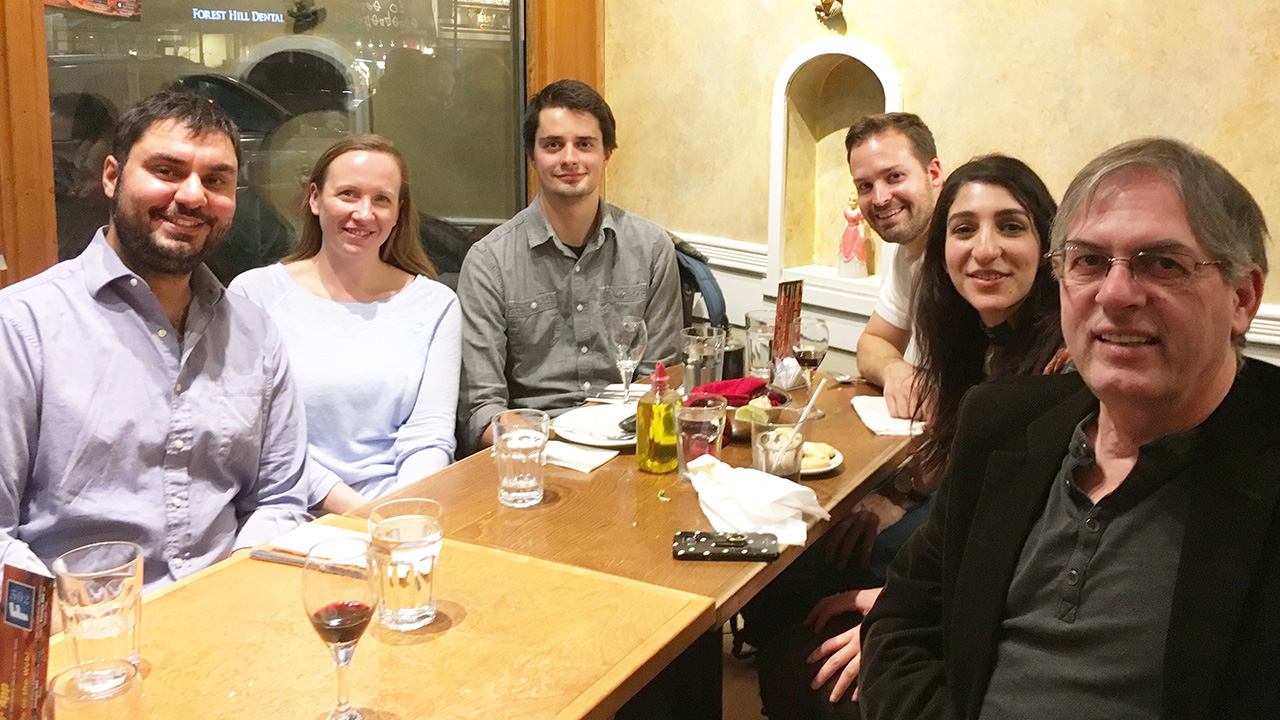Reflections of a postdoc as one chapter ends and a new one begins
As a newly christened PhD, Dr. Aws Abdul-Wahid joined the lab of Sunnybrook Research Institute (SRI) senior scientist Dr. Jean Gariépy as a postdoctoral fellow. Charged with developing the lab’s vaccine program, Abdul-Wahid has spent several years making a therapeutic vaccine that restricts tumour growth and unleashes the immune system’s defenses to prevent the spread of cancer. The vaccine handcuffs a molecule called carcinoembryonic antigen (CEA), a tumour marker for cancers of the colon, rectum, pancreas, stomach, lung, breast and ovaries. Expression of CEA affects aggressiveness of the disease. “We applied the same logic we use for the flu vaccine to present a vaccine that raises the patient’s immune system to block the molecule from doing what it’s supposed to do, thereby stopping circulating cancer cells from ever seeding at secondary sites to prevent onset of metastasis,” says Abdul-Wahid.
He showed the vaccine works in preclinical models; Abdul-Wahid says he is now ready to pass on the torch for the next phase: clinical testing. Having tied up loose ends in the lab, he is moving to Ottawa to take up a position at Health Canada in the Marketed Health Products Directorate. Here, he shares with Alisa Kim reflections on his training and what he will miss most about SRI.
When did you sense it was time to move on?
It wasn’t that I sensed it as much as us bringing the work to its natural conclusion. I knew it was time to move on the moment we got into an agreement, with the help of MaRS Innovation, with VBI Vaccines Inc. I believe VBI is the perfect partner, looking at their direction and who’s at the helm. I think this is what we need to push this forward into the clinic, hopefully to the benefit of people with cancer.
What will you be doing in your new position?
I was hired by Health Canada as a scientific reviewer. I will be reviewing data on biologics, vaccines and biotechnology products to ensure their safety and efficacy.
How did your training at SRI help you get this job?
I never had exposure to cancer research, let alone metastasis. These are topics I learned about in this lab. I started this vaccine program at Princess Margaret Hospital and further developed it at SRI, which provided me with the right environment to expand its scope. At SRI, it’s a different culture, and I think the ability to talk to people from different branches of science is something I picked up here. Also, at SRI we are more proactive in dealing with industry, which gave me that additional element that I would never have been able to acquire had I worked anywhere else. That, in addition to the science that we do, made it all possible.
What have you learned about doing good science from Dr. Gariépy?
One thing I love about Jean is his outlook, which is in stark contrast to my PhD supervisor, who always said to work exclusively on one thing, finish it, shelve it and move onto the next thing. Jean, on the other hand, is not afraid to tackle a side question while you’re still working on the first one. That side question is not necessarily something parallel; it could be completely unrelated. His ability to ‘dance’ across different disciplines is the biggest influence on me.
The second thing is the ability to communicate ideas. Scientists are not always effective in reaching wider audiences with their work. This is not so with him. I’m glad I got to learn from his ability to concisely and clearly put ideas into writing, and to have people from different walks of science, or life, even, appreciate what is going on.
What will you miss most about the lab?
One thing I will definitely miss is the interaction with the people I have been working closely with for so many years. We all work on different projects, and every project requires different expertise. Our group fosters interaction and dialogue that forces us to think analytically. That interaction is something I'll dearly miss.
The environment is something else I will miss. I’m referring particularly to the ease of access to all of the facilities. For example, running to S wing [the research building] to do preclinical work, or going down the hall to use the flow cytometers. This access is something I’m going to miss a lot. Sometimes not all things are under the same roof.
Then there’s the office I’ve been sitting in since 2012. It has such a gorgeous view. My officemate Aaron and I stare out the window just thinking whenever we’re trying to put together a study or discussing experiments, gazing at the air traffic, the birds or the sunset. That is something I will miss a lot.



